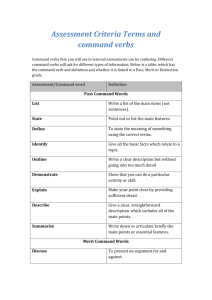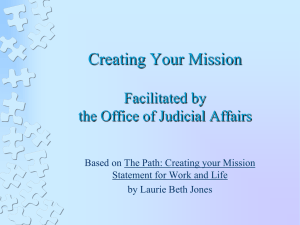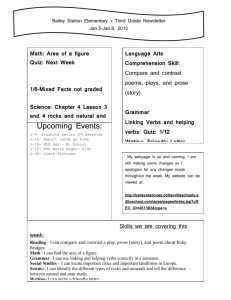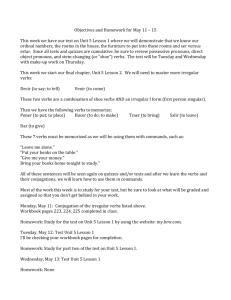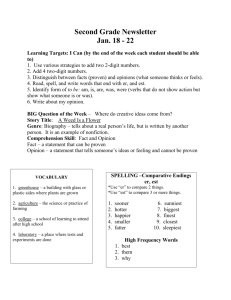Unit 1 Study Guide- EL PRESENTE Regular AR, ER, IR Verbs these
advertisement
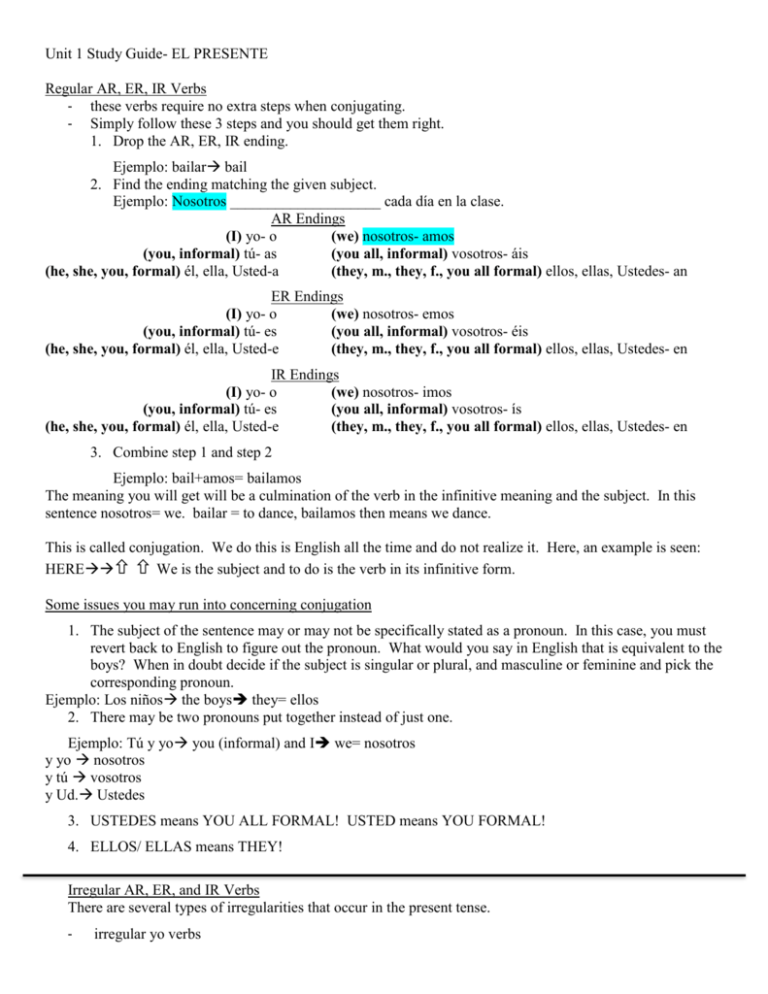
Unit 1 Study Guide- EL PRESENTE Regular AR, ER, IR Verbs - these verbs require no extra steps when conjugating. - Simply follow these 3 steps and you should get them right. 1. Drop the AR, ER, IR ending. Ejemplo: bailar bail 2. Find the ending matching the given subject. Ejemplo: Nosotros ____________________ cada día en la clase. AR Endings (I) yo- o (we) nosotros- amos (you, informal) tú- as (you all, informal) vosotros- áis (he, she, you, formal) él, ella, Usted-a (they, m., they, f., you all formal) ellos, ellas, Ustedes- an ER Endings (I) yo- o (we) nosotros- emos (you, informal) tú- es (you all, informal) vosotros- éis (he, she, you, formal) él, ella, Usted-e (they, m., they, f., you all formal) ellos, ellas, Ustedes- en IR Endings (I) yo- o (we) nosotros- imos (you, informal) tú- es (you all, informal) vosotros- ís (he, she, you, formal) él, ella, Usted-e (they, m., they, f., you all formal) ellos, ellas, Ustedes- en 3. Combine step 1 and step 2 Ejemplo: bail+amos= bailamos The meaning you will get will be a culmination of the verb in the infinitive meaning and the subject. In this sentence nosotros= we. bailar = to dance, bailamos then means we dance. This is called conjugation. We do this is English all the time and do not realize it. Here, an example is seen: HERE We is the subject and to do is the verb in its infinitive form. Some issues you may run into concerning conjugation 1. The subject of the sentence may or may not be specifically stated as a pronoun. In this case, you must revert back to English to figure out the pronoun. What would you say in English that is equivalent to the boys? When in doubt decide if the subject is singular or plural, and masculine or feminine and pick the corresponding pronoun. Ejemplo: Los niños the boys they= ellos 2. There may be two pronouns put together instead of just one. Ejemplo: Tú y yo you (informal) and I we= nosotros y yo nosotros y tú vosotros y Ud. Ustedes 3. USTEDES means YOU ALL FORMAL! USTED means YOU FORMAL! 4. ELLOS/ ELLAS means THEY! Irregular AR, ER, and IR Verbs There are several types of irregularities that occur in the present tense. - irregular yo verbs Types: yo- go, oy- yo, -zco, yo-jo, -guir verbs, and totally irregular yo -irregular: estar, ir, ser, oír, oler, tener, venir -stem changing verbs: Types: ei, eie, oue, uue You have a chart with a list of all these verbs. Here are a few quick tips: 1. Yo-go verbs are simply verbs that take on –go as an ending instead of the regular –o only. Ejemplo: poner- yo ≠ pono, poner- yo = pongo **REMEMBER- caer and traer get the letter -i- added to their yo forms. Ejemplo: caer caigo, traer traigo** 2. The same applies for –guir (verbs ending in -guir), oy-yo, -zco, and yo-jo verbs except you replace the regular–o with the appropriate ending. Ejemplo de guir verbs: yo-distinguir ≠ distinguo, yo-distinguir = distingo Ejemplo de oy-yo: yo-dar ≠ do, yo-dar = doy Ejemplo de –zco(verbs ending in –cir/-cer with exception of decir and hacer (yo-go’s) : yo-conocer ≠ conoco, yo-conocer = conozco Ejemplo de yo-jo: yo-escoger ≠ escogo, yo-escoger = ecojo 3. The totally irregular yo verbs are different, but it’s important to remember that they are only irregular in the yo form. Ejemplo: saber sé, caber quepo, ver veo saber- to know (facts, something) sé sabemos sabes sabéis sabe saben cabe caber- to fit quepo cabemos cabes cabéis caben ve ver- to see veo vemos ves veis ven 4. There are several verbs in the present tense that are totally irregular in all forms. You simply have to memorize the forms. Los verbos irregulares: ir, estar, ser, oler, and oír ir voy vas va vamos vais van estar ser oler estoy estamos soy somos huelo olemos estás estáis eres sois hueles oléis está están es son huele huelen oír oigo oímos oyes oís oye oyen 5. There are some verbs that stem change and have an irregular yo form. These are verbs such as tener and venir. tener tengo tienes tiene tenemos tenéis tienen venir vengo vienes viene venimos venís vienen 6. The last thing that will probably trip you up in the present tense is a stem changing verb. There are a lot of them but thankfully, there is a trick to remembering which type each verb is. You do have to memorize which verbs stem change. (IR VERBS ONLY) (AR, ER, IR VERBS) (AR, ER, IR VERBS) (1 AR VERB) ei eie oue uue -pedir -tener (yo-go) -almorzar -jugar -servir -venir (yo-go) -morir -vestirse (reflexive) -cerrar -dormir -repetir -entender -mover -decir (yo-go) -preferir -aprobar -elegir (yo-jo) -sentarse (reflexive) -volver -seguir (-uir verb) -sentirse (reflexive) -colgar -sonreír -mentir -mostrar -encender -volar -perder -encontrar -pensar -morder -empezar -sonar -advertir -hervir -consentir -convertir


